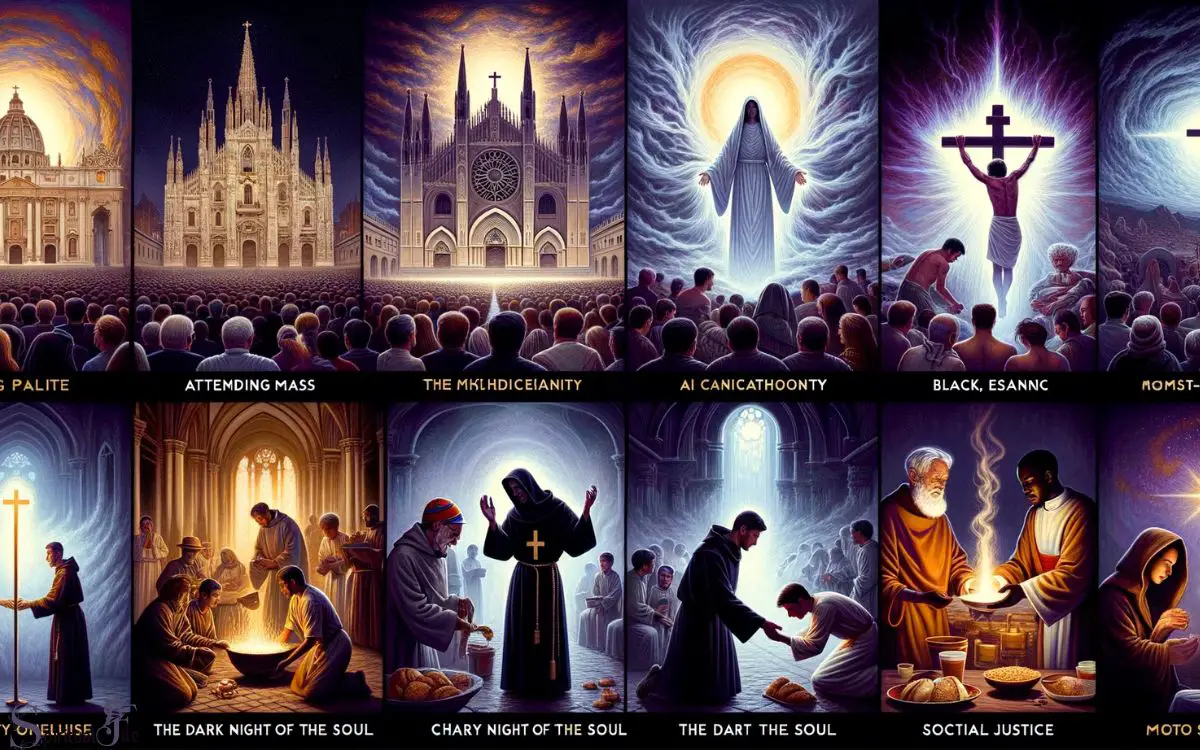Examples of Catholic Spirituality: Liturgical!
Catholic spirituality includes various forms of expressions such as the contemplative, the active, Liturgical, Charismatic and Social Justice. These are demonstrated through different devotions and practices.

Key Takeaway
5 Interpretations: Examples of Catholic Spirituality
| Interpretation | Description |
|---|---|
| Sacramental Life | Catholic spirituality often revolves around a sacramental life, engaging in rituals like the Eucharist and confession to connect with God’s grace and presence. |
| Prayer and Devotion | It encompasses prayer and devotion, where Catholics communicate with God, the saints, and the Virgin Mary, deepening their spiritual connection. |
| Moral and Ethical Framework | Catholic spirituality provides a moral and ethical framework, guiding individuals to live by values like love, forgiveness, and compassion. |
| Community and Worship | It emphasizes community and worship, fostering a sense of belonging and collective worship through Mass and congregational activities. |
| Mary and Saints Devotion | Catholics often express their spirituality through devotion to Mary and the saints, seeking intercession and inspiration from these revered figures. |
Traditional Catholic Practices

Traditional catholic practices encompass various examples of catholic spirituality. These include sacraments, regular mass attendance, devotion to saints, prayer, and participation in religious rituals and traditions.
By engaging in these practices, catholics deepen their faith and strengthen their connection with god and the church.
The Rosary: A Powerful Devotional Tool
The rosary is a deeply cherished prayer in the catholic tradition. Through the recitation of prayers and contemplation of significant events in the lives of jesus and mary.
- Praying with beads: The rosary consists of a string of beads that helps catholics keep count of the prayers. Each bead signifies a specific prayer, guiding the faithful through a sequence of prayers such as the our father, hail mary, and glory be.
- Mysteries of the rosary: The rosary is divided into four sets of mysteries: joyful, sorrowful, glorious, and luminous. These mysteries invite catholics to reflect on significant events from the lives of jesus and mary, allowing for a deeper understanding of their faith.
- Meditative prayers: The repetitive nature of the rosary encourages meditation and contemplation. By focusing on the prayers and mysteries, catholics are able to sink into a state of deep prayer, fostering spiritual growth and a closer relationship with god.
Fasting And Abstinence: Disciplines For Spiritual Growth
Fasting and abstinence are integral practices in catholic spirituality, offering individuals an opportunity for self-discipline and spiritual growth.
Here are the key aspects of fasting and abstinence:
Lenten season: The forty days of lent, leading up to easter, is a significant period for fasting and abstinence in the catholic church.
During this time, catholics may choose to abstain from meat on fridays and engage in fasting on ash wednesday and good friday.
Sacrifice and self-denial: Fasting and abstinence involve voluntarily giving up certain pleasures or desires as acts of sacrifice and self-discipline.
By denying oneself in these ways, catholics aim to deepen their spiritual focus, redirect their desires toward god, and foster a spirit of humility.
Intentional reflection: Fasting and abstinence create space for intentional reflection on one’s relationship with god and the needs of others.
Through these practices, individuals can develop a greater sense of compassion, empathy, and solidarity with those who suffer.
Mystical Spirituality In Catholicism

Catholicism embraces various forms of mystical spirituality, such as contemplative prayer, the practice of lectio divina, and devotion to the eucharist.
These examples of catholic spirituality help believers connect with god on a deeper, more mystical level.
Contemplative Prayer: Seeking Union With God
Contemplative prayer is at the heart of mystical spirituality in catholicism. It allows individuals to quiet their minds, focus on god’s presence, and deepen their relationship with the divine.
Through this practice, believers aim to seek union with god and experience his love and guidance in their lives.
- Centering prayer: A form of contemplative prayer that involves quietly sitting in silence, letting go of thoughts, and opening oneself to god’s presence.
- Lectio divina: A meditative practice of prayerfully reading and reflecting on scripture, allowing god’s word to speak to the heart.
- Praying the rosary: A contemplative prayer method involving repetitive recitation of prayers and meditation on the life and teachings of jesus and mary.
The Dark Night Of The Soul: Embracing Spiritual Purification
The concept of the dark night of the soul, popularized by the mystic saint john of the cross, explores the challenging periods of spiritual purification that individuals may journey through.
These difficult experiences serve as a means of purging attachments, ego, and worldly desires, leading to a deeper union with god.
- Letting go of attachments: Detaching oneself from material possessions, desires, and identifying with worldly achievements to focus on the spiritual journey.
- Embracing spiritual emptiness: Surrendering to feelings of spiritual aridity and emptiness as opportunities for growth and reliance on god’s grace.
- Seeking divine transformation: Embracing the process of spiritual purification as a way to be transformed into the image of god and find true spiritual fulfillment.
By engaging in contemplative prayer, embracing the dark night of the soul, and drawing inspiration from the lives of saints and mystics, catholic believers can deepen their understanding of mystical spirituality and foster a stronger connection with god.
How Does Liturgical Catholic Spirituality Differ from Spiritual Experiences in Christianity?
Liturgical Catholic spirituality is grounded in the structured ritual of the Mass, while spiritual experiences in Christianity can vary widely. For example, charismatic prayer groups and personal encounters with God are common examples of spiritual experiences outside of the liturgical framework.
Catholic Social Justice Initiatives

Catholic social justice initiatives exemplify the values of catholic spirituality, emphasizing compassion, dignity, and care for the marginalized and vulnerable in society.
These initiatives actively promote social equality and advocate for the rights of all individuals, reflecting the teachings of the catholic faith.
Catholic Social Teaching: A Call To Promote Human Dignity
Catholic social teaching is a core aspect of catholic spirituality, highlighting the importance of promoting human dignity and justice in society.
Here are key principles that guide this approach:
- Solidarity: The belief in the interconnectedness of all human beings calls catholics to stand in solidarity with the marginalized and vulnerable.
- Subsidiarity: Empowering individuals and communities to address their own needs by ensuring decision-making power is as close to the people as possible.
- Life and dignity of the human person: Recognizing the inherent worth and value of every human life, from conception to natural death.
- Preferential option for the poor and vulnerable: Placing special emphasis on the needs of the economically disadvantaged and marginalized.
- The common good: Working together to build a society that supports the well-being and flourishing of all individuals.
Charity And Service: Living Out Christ’s Love For Others
Charity and service are fundamental aspects of catholic spirituality, guided by the teachings of christ to love and serve one another.
Here are ways catholics live out this call:
- Volunteering at local shelters and food banks to serve those experiencing homelessness and hunger.
- Visiting the sick and elderly in hospitals and nursing homes, offering companionship and support.
- Engaging in mission trips and charitable initiatives to help communities in need locally and globally.
- Supporting catholic charities and organizations that provide assistance to the marginalized and underserved.
- Extending acts of kindness and mercy to all individuals, regardless of their circumstances.
Catholic social justice initiatives embody the teachings of jesus christ, inspiring catholics to actively promote human dignity, serve others selflessly, and advocate for those in need.
By embracing these principles, catholics strive to build a more just and compassionate society that reflects the love of christ.
Conclusion
Overall, catholic spirituality offers a rich and diverse array of practices and beliefs that can deeply enrich a person’s spiritual journey.
From the sacraments and liturgical traditions to the devotion to mary and the saints, catholics have a multitude of resources to draw upon to deepen their relationship with god.
The examples outlined in this blog post provide a glimpse into the wide range of expressions of catholic spirituality, from contemplative practices to more interactive forms of worship.






